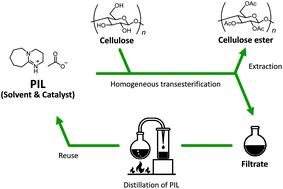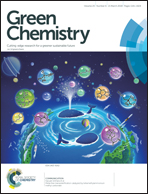Cellulose-dissolving protic ionic liquids as low cost catalysts for direct transesterification reactions of cellulose†
Abstract
Cellulose acetate (CA) is a resin derived from biomass. In addition to its various superior properties, CA is preferable to existing petroleum-derived resins from the viewpoint of green chemistry. Therefore, the acetylation of cellulose is one of the most important subjects in cellulose research. In this study, we found that the acetylation of cellulose could proceed in some protic ionic liquids (PILs) composed of amidine and acetic acid with ΔpKa = ca. 8.4–8.7 under mild conditions without any catalyst. The degree of substitution (DS) of the produced CA was above 1.84, and the maximum DS was 2.87 when the ΔpKa of the PIL was about 8.5. In propionate-based PILs, cellulose was not only acetylated but also propionated; however, the cellulose acetylation did not occur in formate-based PILs. It was revealed that the esterification of cellulose proceeded through the anion exchange between carboxylic anhydride and anion species of the PIL.



 Please wait while we load your content...
Please wait while we load your content...